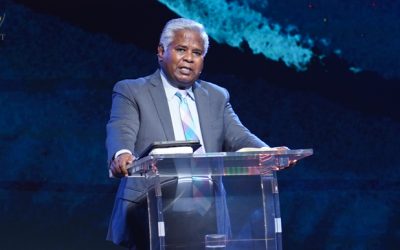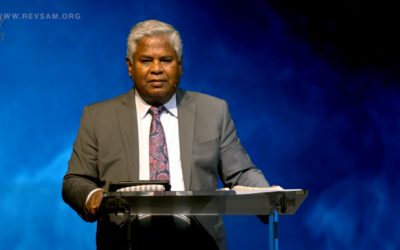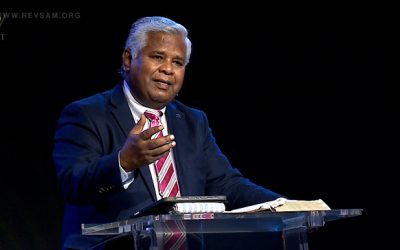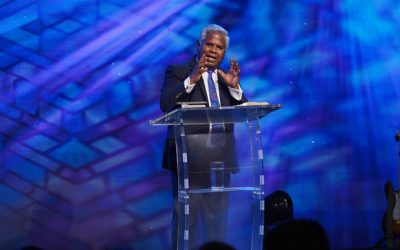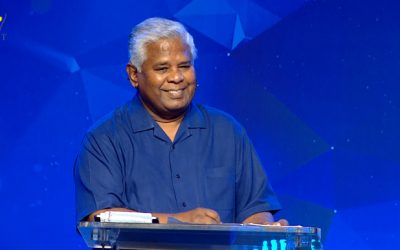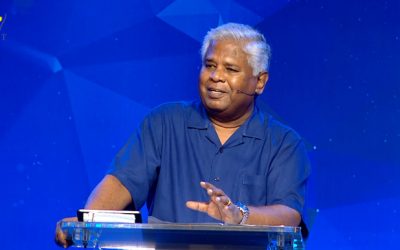
Abounding Grace (Vol. 45) – How Grace Changes Us? (Part-2)
Sunday English Service – 21 NOV 21
Transcript
Please turn with me to Galatians, chapter 5. Galatians, chapter 5 and let me read to you from verse 16 onwards; verse 16, all the way up to verse 25. Galatians chapter 5, verse 16, to 25. So, I say, walk by the Spirit, and you will not gratify the desires of the flesh. For the flesh desires what is contrary to the Spirit, and the Spirit what is contrary to the flesh. They are in conflict with each other, so that you are not to do whatever you want. But if you are led by the Spirit, you are not under the law.
The acts of the flesh are obvious: sexual immorality, impurity, and debauchery; idolatry and witchcraft; hatred, discord, jealousy, fits of rage, selfish ambition, dissensions, factions, and envy; drunkenness, orgies, and the like. I warn you, as I did before, that those who live like this will not inherit the kingdom of God.
But the fruit of the Spirit is love, joy, peace, forbearance, kindness, goodness, faithfulness, gentleness, and self-control. Against such things there is no law. Those who belong to Christ Jesus have crucified the flesh with its passions and desires. Since we live by the Spirit, let us keep in step with the Spirit.
I want to continue what I began last week. We’ve been doing a long series on ‘Abounding Grace’; how that grace abounds much more than sin. Because Paul says, “Where sin abounded, grace did much more abound”, meaning that sin comes into people’s lives and destroys and ruins everything, but the grace of God comes in, in salvation, and not only fixes everything that’s been ruined, but makes everything more beautiful and wonderful than ever before. This is the theme that we have been talking about and we came to Galatians chapter five, because we started talking about the law and grace and so on, certain issues related to that.
So, we dealt with a lot of passages in Galatians, because Galatians is all about law and grace. Paul had gone to the Galatian region and preached Christ and a lot of Gentiles have come to Christ. Churches have been started in various cities. But right after Paul visited there and left there, some others went there—Judaizers went there—they went and preached, saying that people ought to keep the law, they need to get circumcised, follow the rituals and ceremonies of the Jewish law, talking to the Gentiles, telling them to follow the Jewish law, telling them that is how they can be saved. Paul taught them saying that if you believe in Jesus, you will be saved. As a result, you will keep the moral laws, you know, like the 10 Commandments and all of that. You’ll keep the moral laws as a result of getting saved, not to get saved, but you just put your faith in Jesus, you will be saved and as a result, you live by the moral laws of God. But these people went, and they taught a totally different gospel. They said, you believe in Jesus – that’s important. But then, you need to keep the law, then only, you will be saved. Now, there’s a big difference between the two. So, the book of Galatians, was written to deal with this whole issue, to correct the situation because some of the people there were planning to go into the law and follow the law. And he’s trying to show them how wrong it is and how dangerous it will be if they went and followed the law. It’s unbelievable. The things that he says are very shocking and really very refreshing, I would say, because it really explains the whole matter about the law and grace.
So, we’ve been dealing with this and last week, I read this passage and I showed you how that sin has come into our lives and because of that, we are people that have various acts of the flesh, which are so obvious, that are listed here. There is a big list from verse 19 to 21 about the acts of the flesh that’s become a part of our lives. It has come into our lives, and we have been polluted by this kind of lifestyle. But then, when we come to Christ, God is working in us, turning us into a different kind of people, the kind of people that will display what is called, ‘the fruit of the Spirit’ – verse 22 to 23. There are nine different fruits of the Spirit, that is supposed to be in the believer. Now, how do you go from the acts of the flesh to the fruit of the Spirit? How do you go from being a person that lives according to the lusts and the desires of the flesh, which is what sin has done to us? That’s the damage that sin has caused. How do you go from that kind of life to a life that is very divine, that is very beautiful and wonderful? A life that is described by the fruit of the Spirit. That is what we’ve been talking about.
Now, in order to understand that, first, we need to understand the principles laid out in verses 16, 17 and 18. The three verses lay out three principles; I’ll mention them today. I explained it last week, but let me go through it again, kind of, explain it slightly differently. 16, 17 and 18, each verse gives us a principle. Then verse 19, to 23 is talking about the acts of the flesh, and the fruit of the Spirit – the two different kinds of lifestyle. And then verse 24, and 25 tells us what we need to do in order to go from being a people that live according to the acts of the flesh, to becoming a people that live with the fruit of the Spirit. What do we do in order to go from here to there? There are two things that are mentioned here. That’s what we want to talk about today but let me cover 16, 17 and 18 right now.
Verse 16 says this—look at the principles, these principles are amazing—he says, “So I say, walk by the Spirit, and you will not gratify the desires of the flesh.” Now, look at the way he puts it. Normally, if you say, “Walk by the Spirit”, then naturally, the next line should be, “And do not gratify the desires of the flesh”. Walk by the Spirit don’t gratify the desires of the flesh; that’s the logical way to put it. But he puts it differently: “Walk by the Spirit, and you will not gratify the desires of the flesh”. The very way he puts it, tells us there is a different process at work here. It is not the regular process that we think about. Many times, we give the other process, you know. We tell the people, “Walk by the Spirit, don’t gratify the desires of the flesh”. When you say something like that, it means, walk by the Spirit, don’t you do these things that are listed here from verse 19, to 21, as the acts of the flesh. Don’t you do those things. Live by the Spirit, but don’t do the acts of the flesh. So, a person hears that kind of thing, and he goes and says, “Alright, I’m going to try very hard; I’m going to work on it now. I’m going to live by the Spirit and walk by the Spirit and I’m going to try to not do or not gratify the desires of the flesh.”
Now, that kind of thing leads to a personal effort and a hard work, trying to not gratify the desires of the flesh. That’s what it leads to, when you say, “Walk by the Spirit and don’t gratify the desires of the flesh”, immediately the person thinks that this is how you go from this kind of life to that kind of life. It’s by your effort, it’s by your power, it’s by you making a very concerted effort to shift from this to that. So, it goes into a self-effort. But if you say, “Walk by the Spirit, and you will not gratify the desires of the flesh”, that’s what he’s saying here. Then that will mean that is there is another process involved. If you walk by the Spirit, the result will be that you will not gratify the desires of the flesh. You’ll walk by the Spirit; you’ll discover what it is to walk by the Spirit, then, it’s not that you will try very hard to not gratify the desires of the flesh. The result of this, will be that. You “will not” – that’s the way he puts it. You will not gratify the desires of the flesh.
It seems like a whole different process is involved, that as you learn to walk by the Spirit, you will weaken the lusts of the flesh. You will weaken the impulses that come from the fallen nature, and you will render them ineffective. When you walk by the Spirit, as you master the walking by the Spirit, the gratifying the desires of the flesh will begin to go down and ultimately, it will be completely gone. That’s what he’s saying. It’s a totally different process involved. So, keep that in mind.
Verse 17 gives you another principle. Verse 17, says, “For the flesh desires what is contrary to the Spirit, and the Spirit what is contrary to the flesh. They are conflict in conflict with each other, so that you are not to do whatever you want”. It’s pretty interesting. The flesh desires what is contrary to the Spirit. In the older English, it says, “The flesh lusts against the Spirit, and the Spirit lusts against the flesh.” The word, “lust” is used. So here, the flesh, the fallen nature, is working against everything that you want to do to live a spiritual life. The flesh is working against your spiritual impulses. Your new nature is wanting you to walk in one way, but your flesh is fighting against it. Your flesh desires are lusts against what is contrary to the Spirit and your Spirit, what is contrary to the flesh. “The Spirit also lusts”, he says.
Now, normally we think about lust as something that has to do with the wrong things. You desire wrong things – that is what we think lust is all about. But here, it’s talking about lust a little differently. Lust is not just about things that are bad, that you’re lusting after. Even the Spirit lusts against the flesh. There are two things in competition with one another, working against each other. The flesh lusts against the Spirit, and the Spirit lusts against the flesh. So, what he’s saying is the flesh is lusting against the Spirit, stopping you from doing what you want to do, spiritually, hindering you from living the spiritual life. But you will discover, now that you’re saved, you are a child of God. there is a spiritual lust that is in you. There is a spiritual desire. Lust is a general word that indicates a very strong desire. That’s the problem; that’s a very poor translation. They say, even desire is a very poor translation; desire is a weak translation. Lust is a strong translation, but it takes you in the wrong direction. It only makes you think about sexual type of things. As soon as you say, “lust”, people’s mind work in that way. They think about sexual things. But this involves much more than sexual things. It involves everything. It’s a much larger issue. It is about a desire that is out of control. This is about a desire that goes overboard. So, many people have suggested that it needs to be translated as over desire or super desire, or overwhelming desire, about anything.
So, there is the flesh that has a super desire, over desire, overwhelming desire. The flesh, of course, desires the wrong things in that way. It puts the emphasis upon the wrong things and makes you desire the wrong things, in an overwhelming way. It’s an over desire; it’s a desire that’s out of whack; it’s out of control. It’s just driving you in that direction, in the wrong direction, but the Spirit’s desire or Spirit’s lust is a good lust. That’s the most interesting thing in that verse. Spirit lusting against the flesh, is a good lust. The Spirit’s lust is not a bad lust. It is a lust that is trying to describe our desire for God, the things of God that knows no bounds, which is overwhelming, that is dominating now, since our new nature has come in. The Spirit is lusting against the flesh. So, he says, “You’ve got something working in your favour. Before, you just had the flesh working against the Spirit. But now, you’re born again, the Spirit is working against the flesh. The spirits lust against the flesh will defeat the flesh’s lust against the Spirit. “If you discover what it is to lust, with the spiritual lust, what it is to desire God and to desire Jesus and to love Jesus, and to walk in His ways, and to follow His path. If you desire this good lust, even that becomes an overwhelming factor in your life. This lust that drives you away from God, making you do the things that are not acceptable, that will be weakened, and that’s power will be rendered ineffective”, he says. So that’s the second principle. The flesh desires what is contrary to the Spirit; the Spirit desires what is contrary to the flesh. So, you need to discover how to desire what the Spirit desires, which is contrary to the flesh, because with that you can defeat the desires of the flesh.
Now, the third thing is verse 18. And this is probably the most interesting thing. Now, these verses look ordinary, but they’re amazing details. You will not find it anywhere else in the New Testament. That’s the way it is put here. Paul is an amazing, very brilliant teacher. And he comes up with these things and look at what he says. “But if you are led by the Spirit, you are not under the law.” What kind of statement is that? I want you to compare it with verse 16. There also, he’s talking about walking by the Spirit. Walking by the Spirit and being led by the Spirit are the same thing, right? But there, in verse 16, he puts something as the opposite of walking by the Spirit. He says, “I say, walk by the Spirit, and you will not gratify the desires of the flesh.” So, gratifying the desires of the flesh is placed as something opposite of walking by the Spirit Gratifying the desires of the flesh is the opposite of walking by the Spirit. But it’s very interesting. In verse 18, he does the similar contrast. He says, “If you’re led by the Spirit”, —which is like walking by the Spirit, it’s the same thing as walking by the Spirit—if you’re led by the Spirit, now, see what he puts as the opposite of being led by the Spirit. What is the opposite of being led by the Spirit? Very interesting. The opposite of being led by the spirit is being under the law. Wow, that is shocking. In other words, let me put these two verses together and tell you what he means. He means, being under the law will cause you to gratify the desires of the flesh. That’s exactly what he’s saying. Gratifying the desires of the flesh, in verse 16, and being under the law are both together, both are opposites of walking by the Spirit or living by the Spirit. It’s not only gratifying the desires of the flesh, which is opposite to walking by the Spirit. It is also being under the law that is against walking by the Spirit.
Now, you’ll never hear anybody else put it like that. Paul is a very logical guy; he works with logic. He’s an educated person, works with logic. So, he says, “Being under the law and gratify the desires of the flesh are one in the same.” In other words, he’s telling those people that are now intending to follow the law, having listened to the Judaizers, who had come and taught them about how they should follow the law in order to get saved and so on. These people seem to have been convinced by those people because those fellows came and talked about Paul, discredited him and said he’s never been with Jesus. He’s just a secondary apostle. He just came late in the history of Christianity. We come from people that originally were with Jesus, like Peter and John and all those people. They taught us this way, but Paul came lately, now he’s saying circumcision is not necessary. How can you say circumcision isn’t necessary? Abraham was circumcised; all his children are circumcised. You want Abraham’s blessing; how can you get it without circumcision?
So, that’s why the third chapter, he’s dealing with Abraham’s blessing and says that Abraham’s blessing is not given to those who are circumcised. It’s not for the physical descendants who are circumcised. It is for those who are of faith. “Those who are a faith are children of Abraham”, he says in third chapter. He completely, you know, untangles that situation. He says, “No, no, no, it is not saying that Abraham’s descendants, who are circumcised, are the ones that are going to receive Abraham’s blessing. In fact, Abraham’s physical children are not the children of Abraham, only those who are of faith are Abraham’s children.” And then he says, “If you’re Christ’s, then you are Abraham’s seed. This promise was given to Abraham and his seed. The seed is Jesus”, he says. See the singular, not plural, one person? So, Abraham and to his seed the promise is given, not Abraham and then his descendants. It is Abraham and then to his seed. The seed is singular, not plural. He points that out in verse 16, in third chapter. The seed refers to Jesus. Then he says, “If you’re Christ’s, then you are the seed of Abraham, and heirs according to the promise.” If you belong to Christ, even though you’re not circumcised, he tells Gentiles, even though you’re not circumcised, you are recipients of all that God has promised Abraham. It is not promised to those that are circumcised; it is promised to all those that will be in Christ, who will belong to the seed. The promise is to Abraham and his seed!
Now, I think it’s a very tremendous argument that he puts forward. He has decided to completely come against this whole idea that in order to get saved, you have to follow circumcision and follow the rituals and ceremonies, the ceremonial laws, the Jewish religion, the moral laws, and the 10 Commandments that you have to follow, you know, but the ceremonial laws are fulfilled in Jesus, why would you want to follow that? That was only a shadow; Jesus is the real. Once the real has come, why would you want to embrace the shadow? Now, you need to follow Jesus, not those things that are pictures of Jesus. And he teaches that very clearly. So, he says, “If you are led by the Spirit, you are not under the law”. In other words, he says, “If you are walking by the Spirit, you will not be under the law”. Now, what does he mean: “You are not under the law”? You are not under the law, does it mean, he says that you don’t have to follow the law? You don’t have to live by the law, the moral law? No. He says, just a few verses before, in verse 13,14, and 15, he says, “If you follow the one commandment, the commandment of love, you will fulfill all the law”. He says that, in chapter 5. You follow the love commandment that covers all the law. So that means he wants you to follow the law. He wants you to live by the moral laws of God. There is no question about it. He is not saying, don’t obey the 10 Commandments; the 10 Commandments are not necessary. No. He says, “One commandment, the love, covers all the law”. So, that means he wants you to obey the law. So, when he says you are not under the law; if you’re led by the Spirit, you are not under the law. Being under the law, to him, does not mean that you are a person that has completely forsaken the law. And, you know, not being under the law does not mean to him, that you should just come out of the law completely, that you don’t obey the laws of God at all. No. To him, he’s not talking about whether you should follow the moral laws or not. Some people take it like that, and they’re discussing that and they’re going in the wrong direction. And there’s a great fight about whether we are under the law, in that sense or not; whether these moral laws apply to us or not. The moral laws apply to us. You read Romans, you read Galatians, you read Ephesians, the latter half of all these epistles. It’s nothing but an exposition on the moral laws. The 10 Commandments he takes and just takes it apart and talks about how to walk by those laws. So, the moral laws are to be followed. Paul is very clear about it in verse 13, 14 and 15, in this same chapter. He says that; he’s very clear about that.
So, to not be under the law, does not mean that you forsake the moral laws. That is not the discussion here. What he’s saying is, when he says you’re not under the law, which means you are not relying on the law. It is one thing to rely on the law, it is totally another thing to do what the law says, the 10 Commandments says, and follow that. To rely, is different from doing what the law says. I hope you see the difference. What does it mean to rely on the law? To rely on the law means, to rely on it, to bring your salvation. To rely on the law to save you. That you cannot do, he says. That is not why the law was given. The law was never going to save you. In Romans, chapter 3, Paul says, “By the law can no man be justified.” You can’t be any clearer than that. No one shall be justified by the law. You can’t be any clearer than that. Nobody can be justified by the law. The law cannot justify anybody; law cannot save anybody; law cannot bring salvation and acceptance for anybody before God. Why was the law given? Law was given to prove the fact of our sin, that we are sinners and that we need a saviour to drive us to Christ, to bring us to Christ. That’s why the law was given. Nobody ever fulfilled the law, except Jesus. So, it’s very clear that law was never given, in the first place, to save anybody. But is the law good? Yes, it’s good! The moral laws are good. Yes, it’s good. Should we follow them? Yes, we should follow them. Not so that it will save us. If you follow it, because you think it’s going to save you, then you are relying on the law. That is what is wrong. Then you are under the law, then you are putting yourself under the law in the wrong way. And when you put yourself under the law in that way, relying on the law to save you, then it will drive you to gratify the desires of the flesh. You may say how do you say that? How can relying on the law drive you to gratify the desires of the flesh. Let me read that verse to you.
Turn to Romans, chapter 7. Romans, chapter 7, verse 7: What shall we say, then? Is the law sin? Certainly not! Now, listen to him. Is the law of sin? No, it’s given by God. It’s not sin. Certainly not! On the contrary, I would not have known sin except through the law. He says, “I came to know sin only through the law. If the law was not there, I will not no sin.” That’s the purpose of the law – to let you know about sin, that sin is there in your life. For I would not have known covetousness unless the law had said, “You shall not covet.”. He says, “I would not have known covetousness, unless the law said, “You shall not covet”. But sin, taking opportunity—listen to this—by the commandment, produced in me all manner of evil desire. For apart from the law, sin was dead. Sin, taking opportunity, by the commandment, produced in me all manner of evil desire. That’s like, you tell your kid, “There’s chocolate cookies on the shelf; don’t you touch it.” Now, you should have gone without saying anything. Because you said, “Don’t you touch it, there are chocolate cookies there”, he is going to be dreaming about chocolate cookies, he’s going to wait for you to get out, he is going to wait for a first chance that he gets to put his hand in there and get the chocolate cookies out, right? Every kid knows that. You have provoked his desire now, by saying that you’re provoked. “The law does that”, he says. That’s what the law does. So, in that way, he says, “If you are walking by the Spirit, then you will not be under the law.” If you’re walking by the Spirit, you will not be under the law; you’re not under the law. How can you be led by the Spirit and still be under the law? If you are under the law, then you’ll be gratifying the desires of the flesh, not walking by the Spirit; you’ll be doing exactly the opposite, he says.
I gave you an example of a kid getting ready for exam. I couldn’t find a better example than that. I have books on examples, thousands of examples, ten thousand examples for preachers and stuff like that. And you search them, there’s not one worthy example there, you know, after searching everything. But this is a lively example, from our town itself. A kid is facing the exam and the parents tell the kid, “I don’t know what you’re going to do, but you got to get 99%.” In India, we do that to our kids, you know. We never got 99% when we studied, but we tell our kid, you better get 99%, otherwise, how am I going to show my face to all your cousins? And all your relatives will be calling us, you know, they’ll all want to know what you got. And if you don’t get 99%, then you’re not going to get into that college, you’re not going to get into this profession, you’re not going to go here, go there, you’re not going to do this. And then our whole family goes down the tube! Our whole future is gone if you don’t get 99%. Now, you’ve ruined that child’s future by saying that. You’re putting that child under such pressure, that’s no wonder people are killing themselves, in our country, every time the result comes out. Back in those days, I remember, it used to be even worse, you know, back in those days. When the results came out, there will be several deaths reported in the paper, on the day of the result. People just go kill themselves, just because they didn’t pass it, you know, or they didn’t get the expected mark. There are some very brilliant kids that get 95% that still want to kill themselves, because they just can’t get their dreams fulfilled. Because somebody around that kid has pinned all their hopes on that kid. And you got to get 99%, otherwise you’re finished and that child feels the pressure like anything and goes and kills herself or himself.
Now, the law does exactly that kind of thing. The law is even worse. In the law, when it comes to following the law, if you’re 99.9% you fail. You read James, chapter 2, verse 10. If you fail in one, you will fail in all. Anybody did the whole SSLC? Yeah? Am I the only one old enough to do the old SSLC? You know about old SSLC that is the old final public exam of the final year of school? I’m sure, there are some here. I’m not the oldest person here, right? I’m not that old, boy. I dread to think like that. The old SSLC was very cruel. You failed sometimes in maths, you know, and maths was a problem for everybody. So, you fail in maths, you lost it by two, three marks. And so, next time you go take tuition and you work on maths, and work very hard on maths, because maths is your problem but next time you fail in English. You fail in one; you failed in everything. Now, you’re living in the period of grace. You can write one subject at a time, write it five times, and get out, you know, and still go to college. What a blessed people you are. You don’t have to bother with these exams, you know, just write one exam at a time, one subject at a time. But back then, I have some friends living in these streets, right here, right around here, that have attempted six times and could not get through and they’re living. They made it alright, you know; their life didn’t end there. They’ve made it fine; they’re right here. I see them even today. Six times they tried, they could not pass because they’ll fail in one thing or the other.
The law is like that. The law is even worse than telling a child get 99%, otherwise we’re finished, you know. How can I answer the phone calls that come? How can I face people? What will I tell so and so? All these concerns, you know. The law is just like that. The law says. “If you are not perfect, if you do not perfectly follow the law, you will not go to Heaven. You will not make it. Your prayer will not be heard. You will not be blessed. God will not have mercy on you. You make one mistake, you’re finished, going straight to hell! I’ve heard that so much, you know. We were great hell preachers, you know. We were more of experts on hell than Heaven. We just scared the people that came. When they heard us, they said, “My God”, you know, “don’t send me to hell, man”, you know. And when you tell them, you make one little mistake, if you’re not perfect, you’re going to straight to hell. Just imagine what kind of torture you’re putting the person through. He is never going to be happy; his life is never going to be happy. He is never going to find a successful Christian life if you preach like that. That’s not Christian preaching. Paul is preaching totally different. He says, “If you are led by the Spirit, you are not under the law. If you’re led by the Spirit, you won’t be under the law. Because if you’re under the law, you will not be led by the Spirit. You will be gratifying the desires of the flesh.” Amazing. I wish I knew those in the back in those days.
In my days, my parents packed me off to every youth meeting, to every hymn session, you know. You go three days there, then they’re going to pray for you. They’re going to preach to you and all your bad stuff is going to be burned off there. So, I went there, and sure enough, they burnt it off there. But when I came back after three days, fourth day there was a resurrection; everything came back again. That was a problem, you know. I always wondered how these guys do it. All these preachers look so holy and so right and just so prim and proper. It looked like they’d never made any mistakes. But I knew them. That’s the problem. When the communion time came, I’ll just slip away and get out of that place because I thought, my God, if I touch that bread, I might die, you know. I was told that. If I sip that cup, I’ll just die; fall down dead. So, we’ll go as a group – we had our own group, sinners, you know. We’ll slip out and we’ll stand outside that church. We’ll be watching who’s taking and who’s doing what. And we’ll be wondering, how’s that guy taking? He’s not that good. He’s not that clean. He’s worse than us, man; look at him! He’s just eating that bread and drinking that cup. We were expecting him to fall dead; he never did. He’s taking it for years, you know. All these questions I had in my mind, but nobody will answer it. In those days if we asked questions, they say, “Shut up! Don’t talk too much.” That’s the way they approached these things. So, I could never ask anybody. So, when I started studying for ministry, I’ve got into this. I want to know the truth, if this is the truth, if Jesus Christ is the truth, if He is the Lord of my life. If this is the truth, and if I have to follow that, then I had to know what it is. And here is the truth. What is the truth? He says, “If you walk in the Spirit, you will not gratify the desires of the flesh.” In other words, if you find out what it is to walk in the Spirit, then the gratifying of the desires of the flesh will be weakened, that impulse will be weakened. You don’t have to try very hard not to gratify the desires of the flesh. You work on walking in the Spirit, then that will weaken the gratification of the desires of the flesh. If you live by the Spirit, then you will not be under the law! These two are opposites. But the way I heard preaching, told me that if you live by the Spirit, then you will be under the law. If you’re under the law, then you’re living by the Spirit. See, it’s exactly the opposite. Now, you tell me what this means then?
So, these are three principles: 16,17 and 18. 16 says that if you live by the Spirit, you will not gratify them. The result of living by the Spirit will be that the gratification of the desires of the flesh will diminish and will be gone in time. 17 says, not only does the flesh lust against the Spirit, but the Spirit also lusts against the flesh. Therefore, you can set the lusting Spirit, which lusts against the flesh, against the flesh that lusts against the Spirit, and let it compete against that, and this will win. The lusting Spirit will win! If you can over desire, if you have the overwhelming desire for Jesus and the things of God, then the desire for the lusts of the flesh will have no place in your life. And verse 18, is the third principle which says, “If you live by the Spirit, you will not be under the law.” In other words, you want to live by the Spirit, you better get out from under the law. What does it mean to get out from under the law? It means, you get out from that state of relying on the law for your salvation. You do what the law says, but your salvation does not depend on it. Amen. Salvation doesn’t depend on it. That’s like telling a kid, you know. you don’t have to get 100% but you do, what you can, what best you can, that you completely relieve the child. Sometimes the kids will do very well, if you encourage them like that, you know. Now, after that, verse 19, begins with the acts of the flesh. And verse 22, comes up with the fruit of the Spirit. That’s how the passage goes. And we’ve dealt with it last week. But then look at verse 24, and 25. Let’s deal with verse 24, and 25. What should we do, to go from here to there, go from people that gratify the desires of our flesh, to people that walk by the Spirit, go from living by the acts of the flesh, to the fruit of the Spirit? How do you go from this to that? Verse 24, and 25, two things you ought to do.
And those who are Christ’s have crucified the flesh with its passions and desires. Let’s look at this. You’ve got to do one thing: you have to crucify the flesh with all its passions and desires. Now, this is another thing that I heard talked about a lot, back in those days. How to crucify the flesh with its passions and desires. Now, they dealt with this idea that it mentions “crucifixion” as the method of putting out the desires of the flesh. It could have said, choke the desires of the flesh, kill the desires of the flesh, cut off, cut its head off, kill it. There are so many ways to kill it but they mentioned crucify. Crucifixion is the method. So, they said, back in those days, I remember it’s talking about slow death, you know. You nail this hand, and then this hand and nail this one leg, and then nail the other leg and then let you hang there for hours. And then you just suffocate and die, as a result of excruciating pain, and agony, and suffering. Hours and hours, you just hang there. And they literally, this Sunday, they’ll nail you this hand and next Sunday, when you come, they’ll nail the other hand. That’s the way it went. It’s to crucify the desires of the flesh. And we thought, boy, you’ve got to do something very drastic, you know? Why does it say to use this method to kill the desires of the flesh? Why not some other method? Why “crucify” the desires of the flesh? The meaning is this. The desires of the flesh are all kinds of things. And for example, one thing it mentions is idolatry. That’s included in the desires of the flesh. And I showed you, idolatry is not just having some kind of idol there to worship. It’s not just that the Bible teaches idolatry in a very broad way. If You look at the New Testament, particularly, it teaches in a very broad way about idolatry. Idolatry is not just worshipping some idol that is there. Idolatry is replacing anything in the place of God. Putting anything else in the place of God. That’s what is idolatry. In that way, you will find many Christians that are into idolatry because they have put something else in the place of God. They’ve given more importance to something else, in the place of God. For example, that kid that is going to appear for the exam and we’ve told him to get 99%. You’ll deal with that kid and check that kind out. For that kid, that 99% is now the idol. That has become more important than God Himself. That’s the most important thing in life. You’ve made it like that. You have elevated that to that kind of status as the most important thing.
Now, how do you crucify it? They said if you don’t get 99%, everybody’s going to laugh at you and everybody’s going to be disappointed. How can you face everybody? How can you answer your relatives and everybody? But when you bring that to the Cross, crucify it means, you bring it to the Cross and deal with it. How do you deal with it by bringing it to the Cross? You come to the Cross and look at Jesus. Meditate upon the Jesus who hung there, who shed every drop of His blood and died there and hung there until He died. He could have gotten down and come off that thing in one minute. He had the power to do so, but He hung there and made sure that He died and gave His life and when He gave His life, He said, “It’s finished”. He completely it, He made sure that everything that we needed to do for our redemption is completely done. And then, He gave up His Spirit to the Father and died. Come to the Cross and think about that; think about what that means to you.
The Bible says, in Romans, chapter 8, verse 32. It says— I’m preaching in two languages; to ship from one to the other, sometime one thing works better than the other. Romans 8, verse 32, talks about God. It says, “He who did not spare His own Son, but delivered Him up for us all, how shall He not with Him also freely give us all things?” Look at what he says, “How shall He not also freely give us all things?” In other words, he’s saying, He gave His life, He gave His Son for you. How will He not give you all things freely? He has given the ultimate: the Only Begotten Son was given on the Cross of Calvary for you. Will He not give you a job? Will He not give you the little things that you’re asking for? Will He not meet your need? Will He not do something for you? He gave His Son. When you consider the Cross, when you bring these things to the Cross and you consider the Cross and look at the things in light of the Cross, then this thing looks like nonsense. It is nothing compared to what is there! In the Cross, you get the assurance that God loves you, that God will do anything for you. If He gave His Son for you, He would do anything for you. That’s what it means! He did not even spare His Son! If He gave the very best, His Only Begotten Son, then what will He not give to you and He will give everything to you, freely, he says! Not because you have been meritorious and that you have enough merits to merit that favour. He’s not working on merit system. Freely, He’ll give you all things! So, when you come to the Cross, the Cross tells you, God loves you. Then, this kid that is hoping for 99% and that becomes the idol, turns around and says, “Well, what if somebody doesn’t love me, all my relatives, my cousins, my aunts and uncles?” You know, who wants to know whether I got 99% or not and they’ll love me, only if I got 99%. Who cares if they love me or not? Jesus loves me. He has accepted me. He is my Lord. God of Heaven and Earth; the God who created Heaven and Earth, has given His Only Begotten Son for me! And the Bible says, “Will He not also give you all things freely?” Anything else that you want! God will give me anything and freely, not based on my merit! His grace will give me everything, therefore, I don’t care whether anybody loves me, appreciates me, thinks that I’m good or bad. It doesn’t matter to me because the ultimate thing is God. God loves me. God will do anything for me. Then what more do I want? I don’t need anybody’s approval. When you think like that, you have crucified all these things of the flesh, all the self-effort. Everything that tries to make things happen on your own strength. You’ve crucified all of those things! That’s how you crucify. Amen
But then, the second thing to do is, in verse 25: If we live in the Spirit, let us also walk in the Spirit. Let’s look at how to walk in the Spirit because if you learn how to walk in the Spirit, then you will not gratify the desires of the flesh. So, how do you walk in the Spirit, how to keep step with the Spirit? How to do that. What does it mean to keep step with the Spirit? To keep step with the Spirit means to lust in the right way, is to allow your spiritual lust to have an overwhelming effect on you, spiritual desires to increase, spiritual desires to become over desires so that it overwhelms the fleshly desires. That is what it means to walk in the Spirit. How this happens, is amazing. And this also, is Paul. In 2 Corinthians, chapter 3, let me read to you from verse 7: But if the ministry of death, written and engraved on stones, was glorious, so that the children of Israel could not look steadily at the face of Moses because of the glory of his countenance, which glory was passing away, how will the ministry of the Spirit not be more glorious? Now, he’s doing some comparison between the lesser and the greater, that kind of comparison. He’s comparing the Old Covenant to the New Covenant, the glory of the Old Covenant against the glory of the New Covenant. And look at the way he puts it. The Old Covenant was written and engraved on the stones. 10 Commandments were written on a stone and given to Moses. But the New Covenant is written in our hearts. It’s a big difference. What’s the use of writing on stones in an indelible manner? Nobody can erase it; it is written on a stone, but nobody could do it. Nobody could succeed in doing what the 10 Commandments said. So, what’s the use of writing in the stone?
Now, God is written in such a way where we can do it. He’s written it in our heart; He’s givens us a heart that will do it! That is what the New Covenant has done and the new birth has done. So, he’s comparing that. When Moses went and got the stone, written with 10 Commandments, he came down, people could look at his face, it seems, because he’s been in the presence of God for 40-days, and the glory of God’s presence was shining on his face, so that his face, his countenance was such that people cannot stand to look at him. So, he had to put a mask — not a Corona mask — something that hide his entire face, I suppose. Maybe not the eyes and the nose, but everything else because the brightness of the glory, the impact of the glory was such that they could not stand to look at it. So, when he came over the people, he had to put the mask and go back. Before God, he took off that mask. People couldn’t stand to look at it. The glory of the Old Covenant was like that, he says.
Now, listen; verse 9: For if the ministry of condemnation had glory… That was, the ministry of condemnation. The law was given to condemn, so that we’ll be driven to God, so that we can be freed from that condemnation. For if the ministry of condemnation had glory, the ministry of righteousness exceeds much more in glory. Just imagine what kind of glory we will have if we spend time in the presence of God. He compares that glory with his glory. Moses went to the presence of God, came back with the glory that people cannot stand to look at his countenance. What kind of glory will you have when you spend time in the presence of God, when you stand before God under the New Covenant, which is greater glory, really? Then he says, “For even what was made glorious had no glory in this respect, because of the glory that excels.” The New Covenant glory excels the Old Covenant glory, but if what is passing away was glorious… See, the Old Covenant was something that is passing away; it was only temporarily there. Now, the New Covenant has come; the Old is done away with. For if what is passing away was glorious, what remains is much more glorious. This is permanent and much more glorious. Therefore, since we have such hope, we use great boldness of speech— unlike Moses, who put a veil over his face so that the children of Israel could not look steadily at the end of what was passing away. But their minds were blinded. For until this day the same veil remains unlifted in the reading of the Old Testament, because the veil is taken away in Christ. The next verse, he says, But even to this day, when Moses is read, a veil lies on their heart. He’s talking about the Jewish people. Still, they don’t believe. Still, they can’t see the truth of God’s Word.
Now, verse 17 says, Now the Lord is the Spirit; and where the Spirit of the Lord is, there is liberty. But we all, with unveiled face, beholding as in a mirror the glory of the Lord. Now, listen to this, verse 18 is the thing that I want to concentrate on. He says, “We all, with unveiled face, beholding as in a mirror the glory of the Lord, are being transformed into the same image from glory to glory, just as by the Spirit of the Lord.” He talks about how the transformation spiritually happens in us. How we change from people that are dominated by the acts of the flesh, the desire isn’t the lust of the flesh to people that live by the fruit of the Spirit. How are we changed? That’s the subject. And he puts it in one verse, he says, “With unveiled face”, we’re not covering our face because we’re believers! We believe! Beholding as in a mirror the glory of the Lord. The mirror is the Word of God. God’s Word is the mirror. Beholding as in a mirror the glory of the Lord. And we are being transformed into the same image, as we behold in this mirror. They were reading the Old Testament; now, we’re reading the New Testament also. And as we behold as in a mirror, the glory of the Lord, we are being transformed into this same image. Same image means which image? The glorious image that we behold. See, just like Moses stood before God, and God has glory on his face. We are beholding as in a mirror the glory of the Lord. And just like Moses, who got God’s glory in his face, we get God’s glory. We are transformed into the very same image from glory to glory, just as by the Spirit of the Lord. In other words, he says, “When you’re looking into the Word, when you’re loving Jesus, when you’re feeding on Jesus, when you love Jesus, and when you embrace Him in your heart, and when you cherish Him, and when you consider Him the greatest love of your life and you have an overwhelming over a desire, a super desire for Him, and you let that dominate you. When you gaze at His glory through the Word of God, when you contemplate His glory, the Spirit of God begins to work on you, as you’re looking at Him and His glory through the Word of God. And the Spirit of God imparts to you the very same glory that you’re beholding. You are being changed from glory to glory just by the Spirit of the Lord.”
Now, since we’re talking so much about glory, let me give you a background for glory. When God made man, the Bible says in Psalm 8, that He crowned Him with glory and honour. Have you read that? He crowned man with glory and honour; that’s how he made man. God crowned with glory and honour. That is the glory that man lost as a result of sin and the object of redemption is to restore to man the glory that he lost and bring him back to that glorious state. This is the object of redemption. Why did God predestine you? Why did God foreordain you? Why did God justify you? Why did God bring the Gospel to you? And why did God touch your heart and draw His heart towards you? Why did God save you? Why are you sitting here? Because the object of God’s redemption is to bring you back into that glorious state in which He made you first. Man was made with glory and honour, crowned with glory and honour. Today, sin has demoted him and brought him down. He does not have that glory and honour. To bring him back to that glory and honour, God is working on it.
And that is mentioned in so many places in the Bible. For example, 1 Corinthians, Chapter 2, Paul talks about Christian preaching. Chapter 2 of 1 Corinthians is the greatest chapter on Christian preaching and what Christian preaching is all about. In verse 7, he says, “We speak the wisdom of God is a mystery…” He’s talking about what we preach as Christian message. What is the Christian preaching about? What does it consist of? Listen to this: We speak the wisdom of God in a mystery, the hidden wisdom, which God ordained before the ages, for our glory. We speak a message, which he calls the wisdom of God, which is the hidden wisdom. It’s not like the philosophy in the world; it’s the hidden wisdom, which God ordained before the ages for our glory. In other words, to put it in simple language, we’re preaching about the wisdom of God, which tells us about the glory that God originally intended for man! How to bring man back to that glory. It is in that connection, he says, in verse 9: But as it is written: “Eye has not seen, nor ear heard, nor mind has ever comprehended the wonderful things that God has prepared for them who love Him.” No eye has seen, no ear has heard, no mind has ever comprehended that kind of wonderful things God has prepared. People don’t understand what the object of redemption is, what God has saved us for, where He’s taking us. What is the object of redemption? What is the object of redemption? That is what Christian preaching is all about? The objective of redemption is a glorious state that we must return to, that originally was intended by God for us. And that is revealed to us by the Holy Spirit, verse 10 says. “No eye saw it, no ear heard it, no mind ever comprehended it”, Isaiah said in chapter 64 and he’s quoting it here. But now, we live in a different age. Moses lived in an age when he said, “I want to see your glory”, he told God. God said, “No, you can’t see your glory. Come, I’ll hide you behind this rock and when I pass by, I’ll put My hand on your face and hide My glory because you’ll die. If you see my glory, you’ll die”, He said. Moses could not behold God’s glory, yet, because he was in the presence of God, the glory that he could not see got on him so much that people could not look at his face.
Now, you and I are you in a different position? That glory that Moses could not see, has now come into us. The Spirit of God is living in us. He resides in us. That glory is in us. When we read the Word of God, which glory do we see? We’re not seeing the glory of a God who’s somewhere in Heaven, up there. This is a mirror. Suppose you’re holding a mirror before you, a natural mirror shows your face, a physical mirror shows your face; the spiritual mirror shows your heart, where the glory of God resides. You hold this mirror; you see the glory of God. You read this; you begin to see what kind of glory belongs to you. And the more you see it, the more you go from glory to glory to glory, and you’re being transformed. I think it’s dawning on people. That is how transformation happens.
So, God made man with glory and honour, crowned with glory and honour, right. That’s how God made man. Originally, man was made in the image and likeness of God. That means, man was made unique; he’s different from animals. What does it mean to say that man was created in the image and likeness of God? Originally, the image and likeness of God can be stated in so many ways. Let me just state quickly. One: the image and likeness of God means that man was a spiritual being, just like God. He had a spiritual faculty or quality about him. No animal has spiritual quality. No animal will be going to church, no animal will be going to seek God somewhere but wherever man is found, he is seeking after God. Anthropologists have gone to places where there are people living in the jungles, who have never seen civilization at all. And among them, they go and they find those people are already worshipping something. Something or the other, they’re worshiping. They don’t know who God is; nobody ever told them. They don’t even have the concept of God, we would think, but they have some concept of God because they’re made with a spiritual faculty and quality in them.
Secondly, man was given capacities in his soul. He’s rational; he’s a thinking being. He can understand certain things. That is the very special nature of man. He can think deeply. Animals think very superficially, you know. They think just to hunt and eat and all that, but man thinks very deeply, so that we can get into the Bible, get into the Word of God, and go deeply into it.
Thirdly, man was made righteous and holy. He had a moral angle about him. There is a moral nature about him. Man had integrity about him. No sin, no corruption was in him when God made him.
Fourthly, man had knowledge of God, not just the ability to think but he was able to relate to God. He had the knowledge of God. He was able to be a companion of God, and he was able to enjoy God, in every way. And then, man had an essential immortality. Death came as a result of sin. The one man’s sin entered the world; through sin, death and it reigns upon all men, Romans 5:12 says. So, man had an essential immortality. He was not born to die; he was born to live. Death came as a result of sin so that everybody dies today. That is sins effect, the Bible says.
Then, there is something about man’s body itself that reflected God. Do you know what that is? In man’s body, you can see the reflection of God. All animals walk on all fours. They’re looking down, walking on all fours, but man stands upright. The very fact that you and I stand upright – when you stand before the mirror next time, think about that. Standing upright, and you’re able to look up to God, look up to Heaven, enjoy God, have companionship with God. The very fact that you stand up upright, totally different from all other creatures, tells you that you are very specially made, that you are a man made in the image and likeness of God.
And finally, God made man as the lord of creation. His overall creation is supposed to rule and reign and have dominion over all creation. “Let them have dominion”, God said. Remember, in Genesis 1? So, this is the way God made man. But then, man lost all of that. The Bible says, in Romans chapter 3, verse 23, Paul says, “All have sinned and come short of the glory of God”. Come short of what? Of the glory of God. The glorious state is lost. It’s like a beautiful art is there. Beautiful, wonderful, but somebody has smeared it, somebody has ruined it. That beauty is there, but it is marred and defaced right now. That’s what it means. Man is still man. Man is still in the image and likeness of God. He is still a spiritual being; he is still a thinking, rational being. He still stands upright. He still has the capacity to enjoy God but he is not enjoying God. He’s enjoying something else. He thinks but he’s thinking wrong things. Everything is working in a different way right now. All have sinned and come short of the glory of God. The world gets angry when you say, “All have sinned”.
Somebody sent me a WhatsApp message that said somewhere they’ve banned the Bible; it seems because the Bible says things like this. They feel that the Bible should now come within their borders. They ridicule this message because they say, no, they don’t believe in the Bible. How can how can you say all have sinned and come short of the glory of God? The Bible says that. You take a blind man who does not have any ability to see and make him stand before what Rembrandt has made, a sculpture or painting that goes for millions of dollars apiece and you make him stand before Him. You can enjoy it but he won’t have the ability to enjoy it. Just because he cannot enjoy it, it doesn’t mean the painting is bad or the sculpture is bad. It means his eyes are bad, that’s why he cannot enjoy it. You can hear music where Mozart and Bach and all these people, great music played by the greatest orchestras in the world and you feel like you gone to Heaven. That’s how this music and these pieces sound. But a man who is totally deaf cannot enjoy anything at all. The fact that he does not enjoy it, does not mean, or speak something bad about the music. The music is good. His ears are bad. He cannot hear it. That’s the problem.
So, sin has led to terrible consequences and the Bible talks about a lot. And here itself, we read about the acts of the flesh, all kinds of things that has come as a result of sin. From verse 19 onwards, we read about all that: adultery, fornication, uncleanness, lewdness, idolatry, sorcery, hatred, contentions, jealousies, outbursts of wrath, selfish ambitions, dissensions, heresies, envy, murders, drunkenness, revelries… it’s a big list. Drastic results, it even affects his physical part. It has affected him spiritually, it has affected his soul, in his mind, in his emotions, in his will and it has affected him physically, so that death has come, diseases have come and they now dominate. Man was originally crowned with glory and honour but now, he is besieged by all of these kinds of evil as a result of sin. And the aim of redemption is to get rid of all of this and restore men ultimately, in the end, to glory and the image and the likeness of God again. This is what 2 Corinthians 3:18 is all about.
The work has already begun. The work has already begun. God is changing us, bringing us back into glory. Ultimately, when Jesus comes, we’ll be just like Him. We’ll be exactly like He is. Right now, we are being changed into the very same image that He has. You know, in Psalm 84, verse 11, it says, “He gives grace and glory”. We sing that song. The Lord God is a sun and shield; He gives grace and glory. Do you know why the Bible says He gives grace and glory? Because glory is the thing that we lost. That is why grace is given so the glory may be restored; the glory of man can be restored. And God is doing the job already. How is He doing it? Right now, you are hearing the Word of God. You’re loving God. You have a desire for God. That is why you left your home and came to church this morning. That is why you’re getting up in the morning reading the Bible. That is why you’re spending a lot of time hearing things of God. You are desiring God. You have a hunger to pray. You have a desire to know more about God. You’re seeking God. You’re desiring God. Let that desire become overwhelming desire because there is another desire that is competing, trying to compete with this, the desire of the flesh, the fallen nature, that wants to stop you from living a spiritual life, that wants to take over and dominate. Knowing that there is another desire at work wanting to dominate, you allow this flame to burn stronger than ever. Feed it! Feed on Jesus. Feed on the Word of God. Feed on the worship of God; love God like never before. Seek to know Him like never before. Read about the things of God. Hear more and more about the things of God. The more you allow this flame to burn stronger than ever, the more this becomes the over desire, the super desire and overwhelming desire. The desires of the flesh will be undermined; it will become weaker and weaker and weaker. The desire of the Spirit will overtake. The Spirit lusts against the flesh. Let your Spirit and my Spirit lust against the flesh.
There is a good kind of lust. We think that lust is always bad. Paul talks about in verse 17, this kind of lust, the Spirit lusting against the flesh. Do you have a spiritual lust? Do you lust after Jesus? Do lust after the things of God? Do you have an overwhelming, super desire, over desire concerning the things of God? I’m telling you, my friend, when you have that, you’re not just going back and becoming like the first Adam. Let me just say this as I close. Where is He taking us? He is not taking us to become like the first man that He made, who was crowned with glory and honour. You will find this unbelievable! He is taking us beyond that to a greater and a better place and a better state. Not to be like the first Adam because the first Adam is the one that messed it up. He is taking us to become like the second Adam who has become the firstborn of this new creation, Jesus Christ. The second Adam is One that will never fail. So, we are going to have the glory of the very Son of God. He is the firstborn and we are all part of God’s family. And in Hebrews, chapter 2 and in chapter 11, verse 16, we read. That’s why because we are children of God because we are in the image of God’s Son, that we are just like God’s Son Jesus Christ. That is why He is not ashamed to call us His brethren — the Bible says that.
God is not ashamed to call us His brothers. Jesus is not ashamed to call us His brothers and sisters. Amen. Think about that. God is happy to call you His brother and sister and proud to call you His brother and sister. Why? Because you are the very same image and likeness as God’s Son, Jesus Christ. You are just like Him. Therefore, His pointing to you and saying, “Look at him, he’s just like Me. He belongs to the same family. We both have the same Father. We all belong to the same family; the One who sanctifies and the ones who are sanctified. We both come from the one Father, which is why He is not ashamed to call us His brothers. Amen.
Let’s all stand together. Let’s pray. Let’s lift up our hands and give thanks to God for this glorious truth. Meditate on this. Look at those principles that I just mentioned from chapter 5:16, 17 and 18. Look at the way the transformation happens the right way. There is a process going on. The process is going on inside of you and me. We’re all being work upon in that way.
How Grace Changes Us? (Part 12): Fruit of the Spirit
How Grace Changes Us? (Part...
How Grace Changes Us? (Part 11): Endurance
How Grace Changes Us? (Part...
How Grace Changes Us? (Part 10): Truth
How Grace Changes Us? (Part...
How Grace Changes Us? (Part 9): Pride
How Grace Changes Us? (Part...
How Grace Changes Us? (Part 7): Peace
How Grace Changes Us? (Part...
கிருபை நம்மை எவ்வாறு மாற்றுகிறது? (பகுதி 6): தயவு
பெருகுகிற கிருபை (பாகம்-49)...
How Grace Changes Us? (Part 6): Kindness
How Grace Changes Us? (Part...
கிருபை நம்மை எவ்வாறு மாற்றுகிறது? (பகுதி 5): மன்னிப்பு
பெருகுகிற கிருபை (பாகம்-48)...
How Grace Changes Us? (Part 5): Forgiveness
Abounding Grace (Vol.48) -...
How should we react when people don’t believe in Jesus?
How should we react when...







